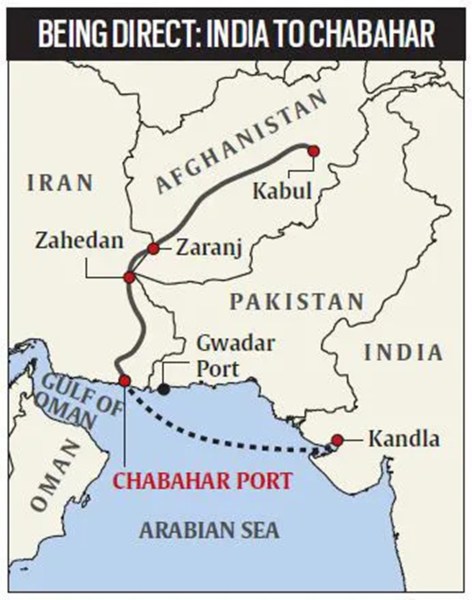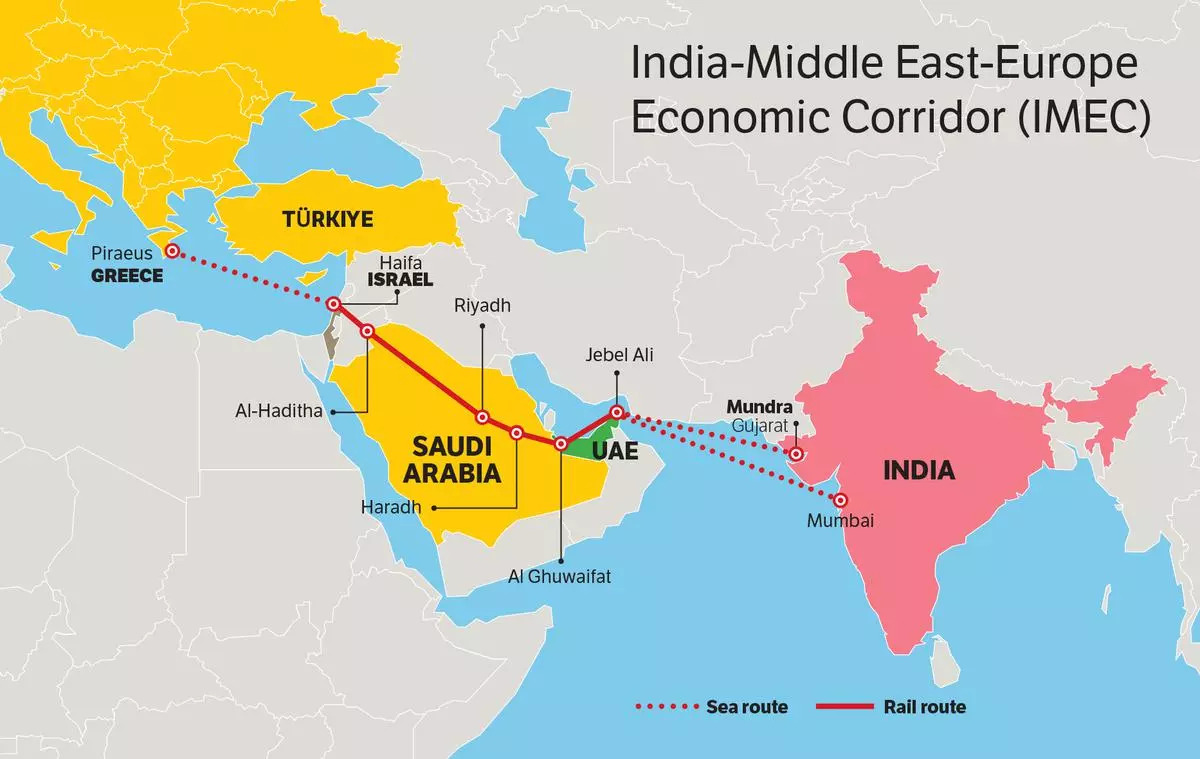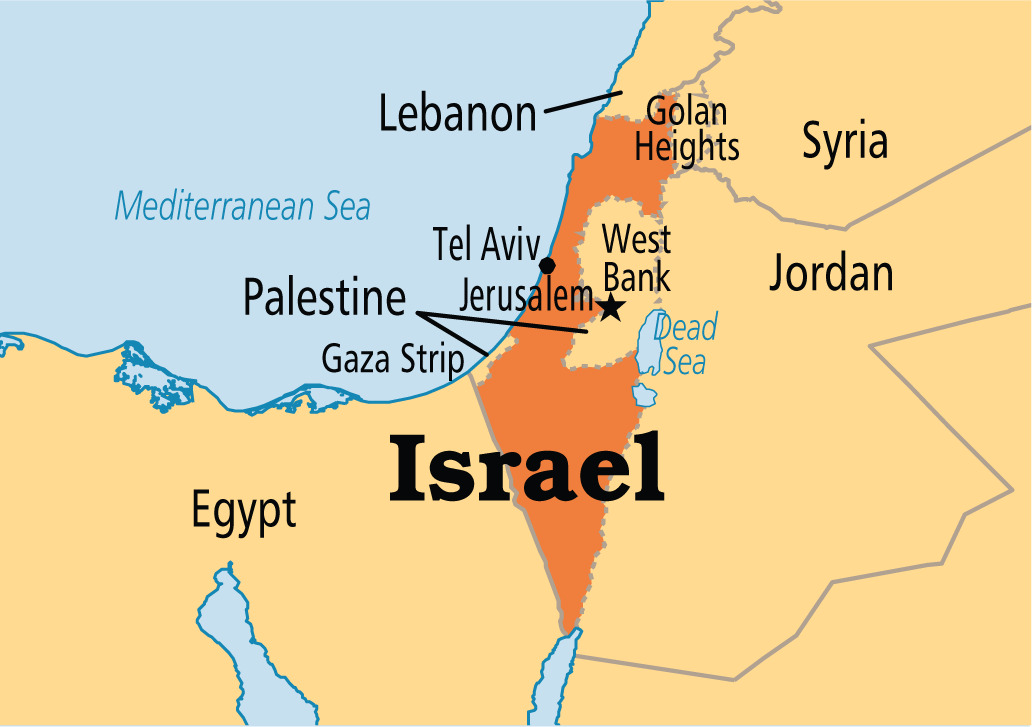- Home
- Prelims
- Mains
- Current Affairs
- Study Materials
- Test Series
 EDITORIALS & ARTICLES
EDITORIALS & ARTICLES
India’s stakes in Iran-Israel conflict — and why it does not want tensions to escalate.
Iran-Israel Relations: Historical Background
- Iran was one of the first countries in the region to recognise Israel after its formation in 1948. It was only after 1979 that their diplomatic ties ended.
- Pre-1979 Iran Israel Ties: In 1948, the opposition of Arab states to Israel led to the first Arab-Israeli war. Iran was not a part of that conflict, and after Israel won, it established ties with the Jewish state. It was the second Muslim-majority country to do so after Turkey.
- The Pahlavi Dynasty: The dynasty under the Shah Mohammad Reza Pahlavi, ruled Iran then. It had US support, as did Israel, and the two countries maintained ties with each other, with Iran also selling oil to Israel amid its economic boycott by Arab states.
- The 1979 Revolution: A religious state was established in Iran after the Shah was overthrown in the 1979 Islamic Revolution. The regime’s view of Israel changed, and it was seen as an occupier of Palestinian land.
- Iran also sought to grow its presence in the region, challenging the two major powers Saudi Arabia and Israel – both of whom were US allies.
- Israel’s Iranian Supreme Leader termed Israel “Little Satan” and the United States the “Great Satan”, seeing the two as parties interfering in the region.
- Iran’s Relations with Egypt: Egypt’s leader Nasser had long championed the idea of “pan-Arabism” in the region, for the cultural commonalities between the Arab states to be translated into larger solidarity and unity. This put Iran, a non-Arab country, at odds with it.
- However, with the death of Nasser in 1970, Iran’s relations with countries such as Egypt warmed.
- Iran-Iraq Accord, 1975: Iran ceased support for Kurdish-Iraqi separatists, reduced hostilities and affected Israel’s strategic value to Iran.
- Post 1979: While Israel and Iran have never engaged in direct military confrontation, both have attempted to inflict damage on the other through proxies and limited strategic attacks.
- Israel has attacked Iranian nuclear facilities from time to time. In the early 2010s, it targeted several facilities and nuclear scientists in a bid to prevent it from developing nuclear weapons.
- Stuxnet Cyberattack, 2010: The US and Israel are believed to have developed Stuxnet, a malicious computer virus that disrupted Iran’s Natanz nuclear facility, marking a significant moment in cyber warfare.
- It was the “first publicly known cyberattack on industrial machinery”.
- Iran’s Proxy Support: Iran is seen as responsible for funding and supporting several militant groups in the region that are anti-Israel and anti-US, such as Hezbollah in Lebanon and Hamas in the Gaza Strip.Regional groups supported by Iran
- Nuclear Issues:One of the greatest points of contention has been Iran’s nuclear program. Israel perceives a nuclear-armed Iran as an existential threat and has repeatedly stated its position that it will take any necessary action, including military strikes, to prevent Iran from developing a nuclear weapon.
- Accusations and international sanctions have further complicated relations, with Israel being a vocal advocate for tough sanctions against Iran in international forums.
Regional groups supported by Iran:
- Hamas- It originated during the first Intifada in 1987 to establish a Palestinian state, it has governed the Gaza Strip since 2007.
- Palestine Islamic Jihad, 1979- It is the second-largest militant group in the Gaza Strip and the West Bank, it receives financial assistance and training from Iran.
- Hezbollah- It means “Party of God” set up by Iran’s Revolutionary Guards in 1982 to fight Israeli forces that had invaded Lebanon that year.
- Houthis- They have been engaged in Yemen’s civil war for over a decade, they attacked ships in the Red Sea during Israel Hamas conflict disrupting a major shipping route between Europe and Asia it is supported by Iran.
- Popular mobilisation Forces- It is Iraq’s state sanctioned coalition of paramilitary groups they maintain close ties with Iran’s Revolutionary Guards.
India’s Relations with Iran & Israel
- Important Ally: India has very difficult choices at the moment as both Iran Israel are important to India for its national interests.
- Iran Israel Conflict India’s Position: It wants there should be “immediate de-escalation” and “step back from violence” and “return to the path of diplomacy” is, therefore, crucial to its national interest.
India Iran Relations:
- Historical Relation: India-Iran Relations back to the ancient times of Indus Valley civilization and trade between the coast of southern Iran and India through the Persian Gulf and the Arabian Sea.
- Political Dimension: Signed a friendship treaty on 15 March 1950. The Tehran Declaration was signed that shared a vision for an “equitable, pluralistic and co-operative international order.
- Geo-Strategic Location: Iran’s unique geographical position provides India access to Central Asia, Afghanistan, and Eurasia markets.
- Energy Security: Iran ranks 2nd globally in terms of gas reserves, presenting an opportunity for fuel diversification, decarbonization and share of gas in India’s energy mix until 2030.
- Economic Ties: Bilateral trade was US$2.5 bn in 2022, reflecting an increase of 48% from 2021.
- Indian Exports: Sugar, man-made staple fibers, electrical machinery and artificial jewelry.
- Indian Imports: Dry fruits, chemicals and glassware.
- Iran included India in the list of countries whose citizens will not require a visa to travel.
- People-to-people and Cultural Ties: The Indian Cultural Centre was established in 2013 and renamed the Swami Vivekananda Cultural Centre (SVCC) in 2018 and India recently decided to include Farsi as one of the nine classical languages under the New Education Policy.
Significance of Iran for India:
- A Traditional Partner: Being a traditional partner, Iran has assumed increased importance in recent times, which will continue to remain valid even in the future.
- This relationship therefore needs to be nurtured and sustained.
- Oil Supplier: Iran has been one of the major suppliers of crude — which has suffered setbacks due to US sanctions.
- Shared Common Concern of Terrorism: Besides, both countries have shared concerns on terrorism emanating from Pakistan and Afghanistan.
- Chabahar Port: Iran has gained strategic importance for India wherein India is operationalising Iran’s Chabahar Port as part of a Tripartite agreement between Iran, Afghanistan, and India.
- It acts as a gateway to Afghanistan and Central Asia — since Pakistan denies land transit to Indian goods.

India Israel Relations:
- Strengthening of Relations: The India Israel relationship has appreciably strengthened in recent years. Mr. Modi became the first Indian Prime Minister to visit Israel and Mr. Netanyahu has twice traveled the other way.
- However, when Israel was indeed established, India duly extended recognition, but kept relations at consular level for more than four decades and in 1992 relations were upgraded to Ambassadorial level.
- Victims of Militancy: Both India and Israel share similar enemies in Islamist extremists, and both enduring terrorist attacks from self-declared holy warriors.
- Enhancement of Cooperation: Security and intelligence co-operation began to grow between India and Israel. Gradually, political and diplomatic relations became deeper.
- Israel became a vital source of defense equipment and intelligence co-operation for India.
- India’s Stand during Hamas Attack: In this attack, India stands in solidarity with Israel.
India’s Strategic Decisions on Grouping
- Association with Abraham Accords: India associated itself with the reorientation of the geopolitics of the Middle East following the Abraham Accords- These are a series of agreements signed in 2020 between Israel and several Arab states, marking a historic shift in diplomatic relations in the Middle East.
- I2U2: Joined the “I2U2” (India, Israel, the United Arab Emirates and the United States).
- IMEC: Recently, India announced IMEC (India-Middle East-Europe-Economic Corridor).
- An India-Middle Eastern Economic Co-operation initiative whose trade route would go from India through Saudi Arabia to the Israeli port of Haifa.

Recently taken Actions:
- Freedom of Navigation: India and Israel discussed the freedom of navigation for ships going through the Bab-el-Mandeb strait, which faced a threat from Yemen’s Houthi rebels.
- The Bab-el-Mandeb Strait connects the Mediterranean Sea and the Indian Ocean and is an important link for India’s trade with the Middle East, Africa and Europe.
- Operation Prosperity Guardian: It is a multinational security initiative launched by the US to counter the growing number of attacks against Israel-bound international traffic.
- Coalition includes the U.K., Bahrain, Canada, France, Italy, the Netherlands, Norway, Spain, and Seychelles, apart from the U.S.
Significance of Israel for India:
- Strategic Importance: India has a very deep strategic relationship with Israel, especially in the context of defence and security partnership.
- The two sides have strong concerns about extremism and terrorism, as both have suffered during the 26/11 Mumbai terror attacks.
- Israel supported India during times of crisis, including the Kargil war in 1999.
- Defence Importance: India shares one of the best relationships with Israel in the current times which is operative in multiple domains with a special focus on provision of high-technology equipment to the defence forces.
- Israel has also emerged as a major defence supplier, along with the US, France and Russia.
- Israel constituted an important ally for provision of the defence equipment, especially till the time India achieves self-reliance through indigenous means in the defence domain.
- It is therefore essential that Israel does not get involved in an intense war with Iran as it is already battling Hamas and Hezbollah.

Challenges for India amid the Iran Israel Conflict:
- Remain Unaffected: India has strategic ties with both Iran and Israel and for decades, it has been able to balance between the two sides. But if the conflict widens, it would be difficult for it to maintain an ambivalent position.
- Concerning Consequences: An escalation between the two countries has direct and tangible consequences for India, mainly on three accounts: its people, its economic interests and strategic needs.
- Impact on People: There are about 18,000 Indians in Israel and about 5,000-10,000 Indians in Iran, about 90 lakh people are living and working in the Gulf and West Asia region. Any conflict that expands will end up posing a risk to the Indian community that is based in the region.
- Example: India asked its citizens not to travel to Israel and Iran.
- Impact on Strategic Needs: India has invested in a strategic relationship with major Arab countries, Iran, and Israel. India has been working in this region to push for the India-Middle-East-Europe Economic corridor, which has strategic as well as economic benefits for India.
- An escalating conflict could adversely impact the consensus that has been built.
- Impact on Economic Interests: Though imports from Russia have increased, Arab states account for two-thirds of India’s oil needs. Higher oil prices will push up inflation and delay any interest rate cuts critical to boost GDP growth. Merchandise exports, already slow, will drop further.
- Sensex and Nifty fell due to escalating Iran Israel conflict, making investors risk-averse.
Road ahead
- Clarification of India’s Position- India has already called for the ‘immediate de-escalation‘ and ‘stepping back from violence‘ and ‘return to the path of diplomacy‘.
- Balance engagements with other key actors in the Middle East- India must try to forever balance its engagement with key regional actors- Egypt, Iran, Israel, Qatar, Turkey, Saudi Arabia, and the United Arab Emirates– whose orientation and interests are often different in the middle eastern conflicts.
- Pursue non-ideological engagements- India must pursue non-ideological engagement in the middle east region to complement India’s expanding interests in the Middle East.
- A Dialogue-based Diplomatic Solution: India had always adopted this approach. India needs to engage with Israel more as Iranian actions have been initiated as a consequence of the Israeli attack on an Iranian complex in Damascus, Syria.
- Proactive Engagement: It is now the responsibility of Israel to absorb the initial drone attacks launched by Iran and show restraint until Iran escalates it further. India must proactively engage with the USA, Iran, Russia, and Israel to ensure that this conflict is contained.
- India has to make all-out efforts so that Iran does not get involved in a sustained conflict with Israel as it will mean a conflict with the USA which has already started emerging in this region of the world.
- Consideration of Future Challenges: A dialogue with the USA is required as it is involved in the Russia-Ukraine War, Israel-Hamas War, Houthis interference in the Red Sea, and the potential Iran Israel conflict.
- Hence, it will become difficult for the USA to meet its responsibilities if China escalates conflict in the South China Sea for integration of Taiwan or other such claims.
- Focus on Development:
- India has to discuss with Israel to establish defence manufacturing facilities in India which will meet the needs of India, Israel and also other friendly countries. It will provide Israel a more secure place to develop its defence industry.
- India must fast-track the completion of the Chabahar Port in Iran which has been already delayed. Once this is completed, operationalised and put to use, it will give additional leverage with Iran to shape Iran’s opinion on its regional and world matters.
- Complete Process Fixation: India has to come up with its ‘process fixation’ in totality to promote its indigenisation drive and to counter the threat from China and Pakistan in addition to its emerging obligations in the new world order.









 Latest News
Latest News General Studies
General Studies